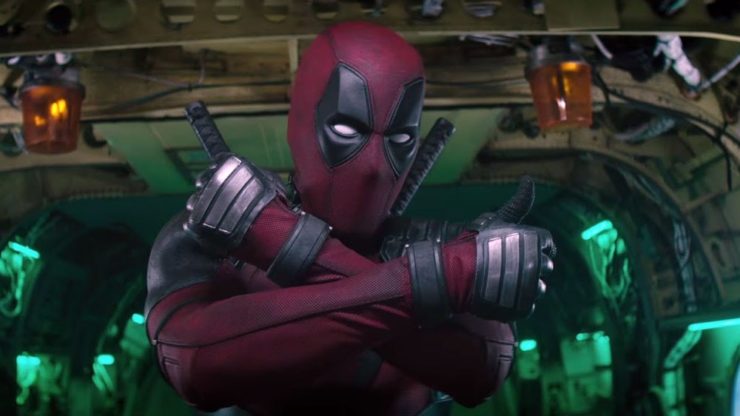How do you up the ante on arguably the world’s biggest surprise superhero hit since 1989’s Batman? Well, on any other film, you’d probably have bigger set pieces, better CGI, and a villain that appears infinitely more powerful than the last.
But this is Deadpool. Which means that our meta jokes are just gonna get more meta.
[Spoilers for Deadpool 2 below]
Whereas Deadpool billed itself as a superpowered carnage fest with swears that is truly a love story, Deadpool 2 bills itself as a superpowered carnage fest with swears that is truly a family story. The fact that it succeeds on those fronts is a testament to how well the people working on it understand their hero and his brand; Deadpool may be full of dismemberment, death, and humanity’s ugly side, but Deadpool himself actually cares about people and love and George Michael’s discography. This is how the character manages to tackle such upsetting themes without the films getting overly nihilistic or bogged down in misery.
The movie’s greatest weakness is that there’s too much in it. It’s hilarious and raunchy and action-packed and full of genuine moments of pain and drama, but there’s so much to get through that the pace of the film is non-existent—it just hits the ground running and never really slows down. There are no true acts, only brief scenes where people talk to break up the action. In some ways, this makes the movie feel shorter than it is, which is deeply jarring by the time you reach the end. It also occasionally undercuts the humor by skipping over the jokes too quickly.
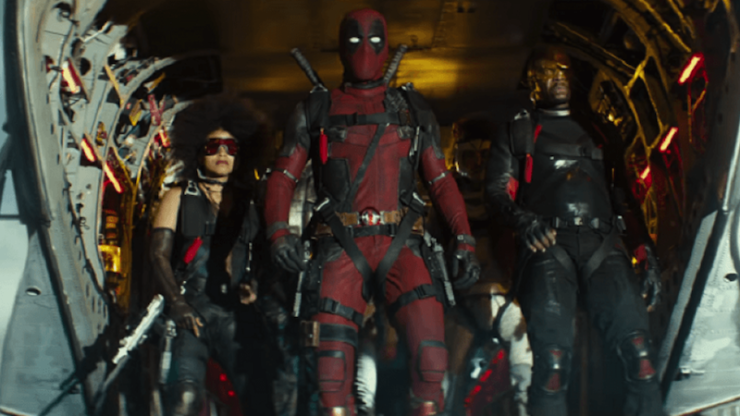
One of the places where this pace works against the film is in the original building of the X-Force team and their subsequent dispatch of the initial lineup as each of them dies due to high-wind accidents except for Domino. (Praise be to Zazie Beetz, who is a shining star as Domino every second she’s on screen.) As a riff on the goofiness of building superhero teams, and the extreme likelihood of losing unvetted recruits, it’s a comical aside in a movie that has much more going on. But because there’s so much more going on, there’s no real chance for the thing to land; the X-Force team is formed, then it’s suddenly gone, and the joke kind of gets lost. (Also, how the hell do you kill Terry Crews, world’s most valuable human, when you have the chance to keep him in your movie? Why did he agree to a mere five minutes in this film? Bring back Terry.) It’s also good that Negasonic Teenage Warhead is revealed to be queer and dating girlfriend Yukio because the film kills off Shatterstar in that first round—an X-Men known for being initially asexual and then polyamorous and bisexual in the comics. The inclusion of Negasonic and Yukio’s relationship makes them the first openly queer superheroes ever seen on film, which is a major mile marker… but it is worth noting that this an R-rated film, and Hollywood has a habit of relegating any form of queerness to that rating.
And we should probably ignore the fact that Yukio already appeared as a completely different person in The Wolverine. And that Juggernaut also appeared entirely differently in X-Men: The Last Stand. This Juggernaut at least references that he’s related to Professor X, so Deadpool 2 is really hoping to tickle your nerd funny bone with the little things.
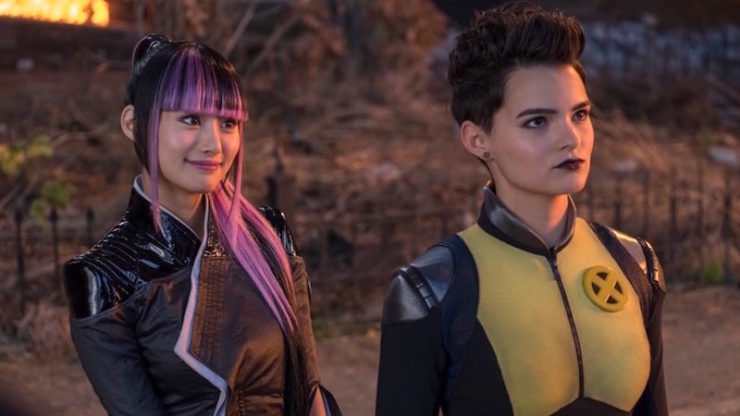
The meta comedy of Deadpool 2 manages to outdo its predecessor both in term of scope and deep cuts. Huge swaths of the movie are set up for meta narratives, including bashing Wolverine for riding Deadpool’s coattails with Logan, and complaining about the A-level X-Men not showing up in the film when they’re standing right behind him; the comedy is scalpel-sharp on those nods and winks. (Noting that Josh Brolin’s Cable is “only 5’11”, not like in the comics” is one of the highlights of the film, easily.) That the movie holds together despite this constant break of the fourth wall proves how culture has shifted on these terms—just as Deadpool wasn’t that kind of hero on his inception, audiences were not accustomed to that type of humor, but now it all goes off without a hitch. Deadpool can critique himself and cinema and tropes even as he’s trucking through his own plot because the conceit has worked, and now the filmmakers can get down and dirty with meta commentary wherever possible.
That doesn’t mean that all the winks and nudges land, however. While it’s fun to see Dopinder again (that’s Deadpool’s cab-driving pal from DP 1), the character smacks of certain racist stereotypes even more than he did in the first film. Deadpool 2 makes the choice to acknowledge it and joke about the decision, as though taking the choice into account means that the film can get away with it. But “hanging the lantern” on racism isn’t going to work, no matter how much the writers of the film want it to, and Dopinder still feels done wrong by, even if he is delightfully played.
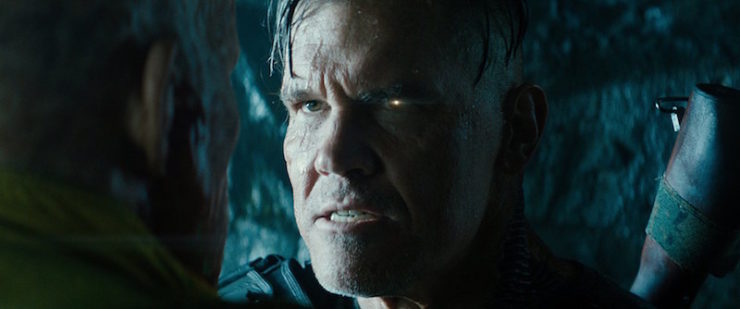
On on a similar note, though a review is not a good place to go into any depth: this movie begins by fridging Wade’s fiancée Vanessa. And it’s a garbage move that the movie later undoes in the tag scene… Wade has Negasonic and Yukio repair Cable’s time travel device and goes back to rescue her (and also undo a few other wrongs, like Ryan Reynolds accepting the Green Lantern script, and Peter’s death during the X-Force debacle, and the alternate Deadpool that we got in Wolverine: Origins). It’s silly in part because the idea that the device can be so easily repaired is a major deus ex machina on their part, but it’s also incredibly rare to see a superhero film reverse that kind of plot point. And while it’s good to undo the fridging, it doesn’t really change the fact that it’s a choice the movie made for the sake of the plot in the first place. Hopefully, they will think of something better to do with her in the next film—aside from wanting to have a baby with Wade because that’s not the full sum of her humanity, though you’d never know from what Hollywood tells us.
On the other hand, Deadpool 2 has isolated moments of real connection that bely its beating heart, and make Wade Wilson a character that we can still get behind (which is no easy feat when your protagonist is a mass murderer). When he decides to ride with the X-Men as a trainee and is taken to defuse a situation that has broken out at a “Mutant Reeducation Center,” he encounters Russell Collins aka Firefist, a young mutant who is in the middle of a standoff with the police. Wade manages to calm the kid down before realizing that he’s being abused by staff of the center, and promptly tries to murder said staff. When Colossus comes down on Wade for not behaving like an X-Men, Wade snaps back that the kid is being hurt by the staff: “You can always tell.” The fact that Deadpool is the sort of character who is aware of these things—and the X-Men pointedly are not in this instance—plays into the character’s particular brand of morality. He may do terrible things, but he does them to terrible people.
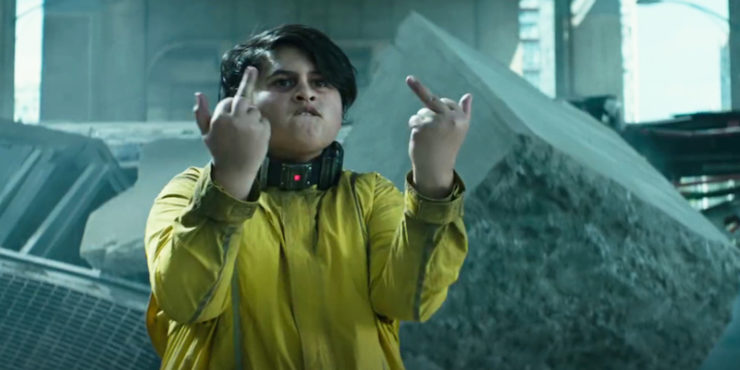
This plays out further in his relationship with Russell, who he’s sent to special mutant prison with following the incident. (The fact that a mutant prison like the “Icebox” exists in a universe where the X-Men are supposedly helping mutantkind is another discomfiting truth that Deadpool is better equipped to handle. In fact, the entire movie contains more than one riff on themes brought up in X2, but without the collective surprise that Xavier’s team shows at the general awfulness of the world.) Russell reveals that he always wanted to be a superhero, and when Wade asks why he couldn’t be, Russell gives him the sideye and says, “Have you ever seen a plus size superhero?” The commentary around all the ways the Russell doesn’t fit the standard mold of superhero—he’s not white, not thin or muscular, and belongs nowhere—make for a pointed setup when Cable reveals to Wade that Firefist is a horrific villain in the future. And Wade’s choice not to believe in that future for Russell is a pointed rejection of that narrative and what a superhero can be.
And there are other places where Deadpool beats out the competition: Like the X-Men, his final X-Force team is nearly half female, which is something both the Avengers and the Justice League still seem to struggle with. And while the story starts with Wade and Vanessa getting ready to create their own little nuclear family, Deadpool 2 isn’t about that at all—it’s about found and created families. It is, weirdly enough, about all of the things that the X-Men are supposed to be about. Only this time, the reassuring cadence of Patrick Stewart is nowhere in sight.
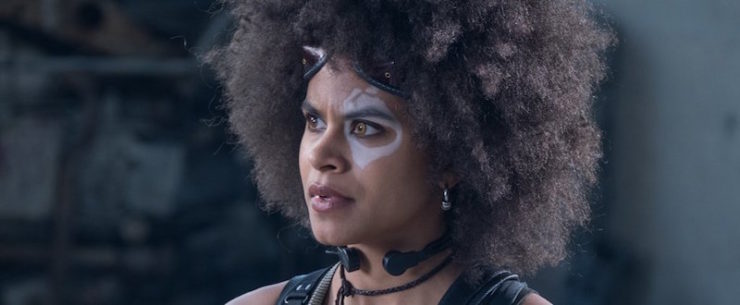
Ultimately, Deadpool 2 is a worthy successor to the first adventure. It has many of the same weaknesses as the first film, but it’s stronger in a lot of the places that worked on the first try. Here’s hoping that every Deadpool film features this weird little family, and that they refine their formula with each outing.
Also, Deadpool can kind of fix the timelines now? Maybe they should keep letting him do that. But, like, in every franchise.
Emmet Asher-Perrin didn’t get a chance to talk about that James Bond opener, but it was a thing of beauty. You can bug her on Twitter and Tumblr, and read more of her work here and elsewhere.










